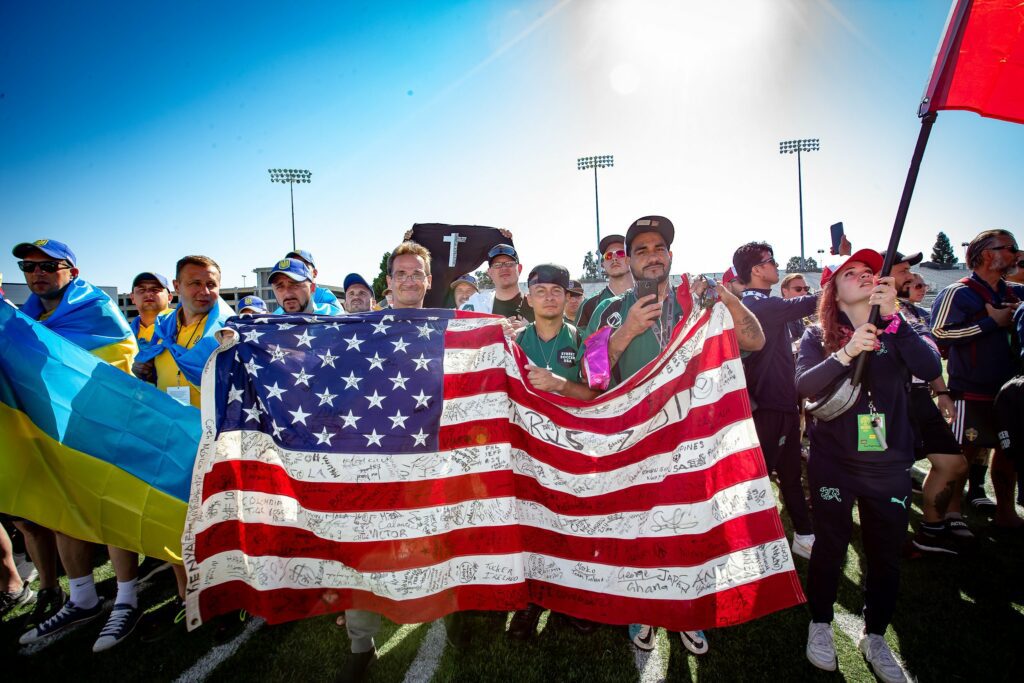

The Homeless World Cup sometimes feels like one big family, where people from all walks of life and different cultures are brought together by the common languages of football and hope. For some, the family ties are biological. Mother and daughter Lourdes Gonzales and Anina Puccio-Gonzales are one such example. Volunteering together as local team guides for the Costa Rican and Chilean players is a way for them to spend some quality time together, support a great organisation, and use their local knowledge to help visiting teams; all while giving Lourdes a chance to walk down memory lane at her alma mater, Sacramento State.
Originally hailing from Sacramento and now living in North Carolina, Lourdes and Anina were due to return to Sacramento for a summer break when they found out about the tournament. It was Anina who originally heard about the opportunity to get involved through her connection with local Major League Soccer (MLS) team, Charlotte FC, where she works as a photographer.
As Anina recalls, one of the Charlotte FC players came up to her and said “Hey, you’re going back to Sacramento, I think there’s an event that you’ll really enjoy.” She goes on to explain, “And I know some of the players on Sac Republic, the team here [in Sacramento], and they said, ‘Hey there’s this major thing. It’s the first time it’s coming to the US.’ So I applied and it was awesome. Just the whole experience.”
Anina’s mother, Lourdes, found out about the Homeless World Cup through her daughter. So far the experience has been really positive.
“It’s been really interesting and great. To get to see all these different countries come together and how there is one pull, which is soccer. It’s been fun to see that camaraderie that happens between all the teams. Seeing them enjoy themselves.” And as a Team Guide, “you get to know your team. You get to know them and to see them in a different light.”
Lourdes and Anina have felt privileged to be part of the Chilean and Costa Rican teams’ journey at the Homeless World Cup in Sacramento and it’s clear from observing the women hanging out with their teams that they are building relationships with the visiting teams, too. Lourdes says she has learned through working with the Costa Rican team how the Homeless World Cup tournament can be a starting point for many of the players. “That’s what I understood after speaking to the coach. He actually was involved for over 10 years, and he himself was one of the players. So he was very excited to be here. It was kind of last minute for him, because another [coach] was supposed to be in his place. This team in particular was on hold. I think I was supposed to have another team, and … two days prior to the beginning of the tournament … it all worked out”
“They’re very invested and very committed and that’s good to see.”
Lourdes may not have been familiar with the Homeless World Cup, but she does know the venue for this year’s Homeless World Cup; the Sacramento State campus. A lot has changed since she studied here: “From the first day, seeing the changes … I almost got lost. I’m thinking, ‘Where am I? What is this building?’” And it’s not just the campus that is familiar. “I actually ran into a couple of Alumni … people that I haven’t seen in 30-something years. They knew me by my nickname. I was really, really surprised.”
At the Homeless World Cup, team guides are volunteers, usually from the local area, who are assigned to the different football teams taking part in the tournament. The team guides’ role is to support them throughout their journey. Support requirements can be varied and unpredictable. For Lourdes and Anina it has been anything from assisting with translation (both mother and daughter speak Spanish, and Lourdes also can get by in Portuguese, Italian and a couple of other languages) and guiding them around the host city and local landmarks, to generally keeping their spirits up. When asked about what the role has been like for Lourdes and Anina, Lourdes replies, “With these kinds of things, as I was telling my daughter, you have to relax. These kinds of events happen organically. You just can’t expect them to be scheduled to a tee. Ultimately [the team] are asking for advice.”
So, given the various ways the team guides can support their teams, what’s the main challenge the mother and daughter duo are dealing with today? The answer: the Chilean team needs ChapStick, proving that sometimes it’s the little things that make the biggest difference. So I leave Lourdes and Anina to focus on the task in hand.